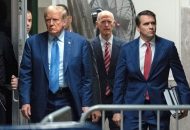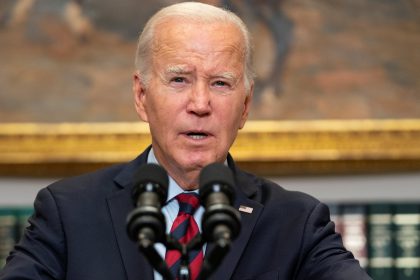China Hits US With New Tariffs on $75 Billion Worth of Products

WASHINGTON — China on Friday announced tariff hikes on $75 billion of U.S. products in retaliation for President Donald Trump’s latest planned increase, deepening the trade conflict between the two nations at a time when the president insists “China wants to make a deal with us.”
The announcement by China’s Finance Ministry came as Trump prepared to meet with leaders of the Group of 7 major economies in France this weekend.
Tariffs of 10% and 5% will take effect on two batches of goods on Sept. 1 and Dec. 15, the ministry said in a statement. It gave no details of what goods would be affected but the timing matches Trump’s planned duty hikes.
A separate statement said tariffs of 25% and 5% would be imposed on U.S.-made autos and auto parts on Dec. 15.
Trump responded with fury on Twitter, saying “the vast amounts of money made and stolen by China from the United States, year after year, for decades, will and must STOP.”
He then “ordered” American companies “to immediately start looking for an alternative to China, including bringing our companies HOME and making your products in the USA.”
Trump said he respond to China’s action Friday afternoon, adding, “This is a GREAT opportunity for the United States. Also, I am ordering all carriers, including Fed Ex, Amazon, UPS and the Post Office, to SEARCH FOR & REFUSE all deliveries of Fentanyl from China (or anywhere else!).”
When he did respond, Trump announced in a tweet that he would retaliate by raising tariffs on $250 billion worth of Chinese goods to 30 percent from the current rate of 25 percent beginning Oct. 1.
He also said the United States would tax the remaining $300 billion worth of imports at a 15 percent rate, rather than the 10 percent he had initially planned. Those levies go into effect on Sept. 1.
The president has been pushing Beijing to narrow its trade surplus with the U.S. almost since the day he took office, but the net result of the conflict to date has been a slowing of both nation’s economies.
In a highly anticipated speech Friday morning, Federal Reserve Chairman Jerome Powell said the global growth outlook has been deteriorating since the middle of last year.
“Trade policy uncertainty seems to be playing a role in the global slowdown and in weak manufacturing and capital spending in the United States,” he said.
He nevertheless vowed in his annual remarks at the central bank’s Jackson Hole symposium to keep the economic expansion going while acknowledging that tariffs and other factors are causing growth to slow.
While not saying specifically where he thought rates should go, Powell promised that the Fed “will act as appropriate to sustain the expansion.”
“Our challenge now is to do what monetary policy can do to sustain the expansion so that the benefits of the strong jobs market extend to more of those still left behind, and so that inflation is centered firmly around 2 percent,” Powell said.
The Fed chairman noted there are “no recent precedents to guide any policy response to the current situation.”
“While monetary policy is a powerful tool that works to support consumer spending, business investment, and public confidence, it cannot provide a settled rulebook for international trade,” he said. “We can, however, try to look through what may be passing events, focus on how trade developments are affecting the outlook, and adjust policy to promote our objectives.”
Trump ripped into Powell on Twitter after the Fed chair’s speech was delivered, questioning whether he is a “bigger enemy” to the United States than Chinese President Xi Jinping.
Trade talks between China and the U.S. have been deadlocked for months, and among the sticking points is just how to unwind the trade conflict.
China wants the U.S. tariffs to be lifted as soon as an agreement takes effect. The Trump administration insists that some should remain in effect for an extended period to ensure China carries out any promises it makes.
Trump announced plans to raise tariffs Sept. 1 on $300 billion of Chinese products after talks broke down in May. Increases on some goods were postponed to Dec. 15.
Trump escalated “trade frictions” and is “seriously threatening the multilateral trading system,” the Chinese Finance Ministry said. “China was forced to take countermeasures.”
























